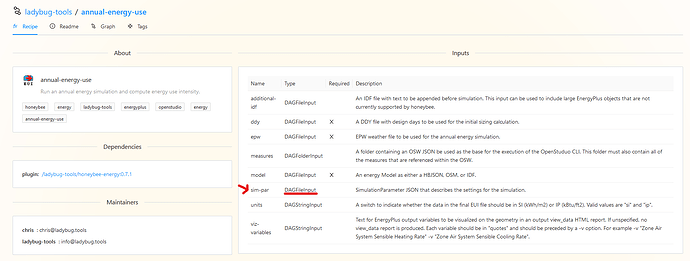Hi,
I am pretty new to using pollination cloud. I want to automatize a feedback loop workflow so models are sent for simulation as they are generated, and their results are downloaded as soon as they are available. My first attempt to do this using streamlit was unsuccessful, and I do not know what the problem is. I have used this topic as guide. My questions are the following:
- What am I doing wrong?
- Is it possible to send a honeybee model directly to the cloud without having to previously save it as a hbjson on a local drive? It is not a big deal for my project, but maybe it is possible.
- What is the process to automatically receive the results from the simulation on Python as soon as they are available?
Thanks for your help.
api_key = 'my_key'
assert api_key is not None, 'You must provide valid Pollination API key.'
# project owner and project name - change them to your account and project names
owner = 'my_username'
project = 'demo'
api_client = ApiClient(api_token=api_key)
# We assume that the recipe has been added to the project manually
recipe = Recipe('ladybug-tools', 'annual-energy-use', '0.5.3', client=api_client)
# Import EPW and DDY files
# set default values
_percentile_ = 0.4
epw = EPW(f"my/epw/file/address")
out_path = os.path.join(f"my/out/file", 'ddy')
ddy_file = epw.to_ddy(out_path, _percentile_)
# for files and folder we have to provide the relative path to
recipe_inputs = {
'ddy': ddy_file,
'epw': epw,
'model': None, # This changes with iterations
'add_idf': None,
'measures': None,
'sim_par': None,
'units': None,
'viz_variables': None
}
# Save models as hbjsons
hbfolder = f"my/hbjson/folder"
for model_nr in range(len(my_models)):
my_models[model_nr].to_hbjson(name = "model" + str(model_nr), folder=hbfolder)
# create a new study
new_study = NewJob(owner, project, recipe, client=api_client)
new_study.name = 'Parametric study submitted from Python'
study_inputs = []
for model in pathlib.Path(hbfolder).glob('*.hbjson'):
inputs = dict(recipe_inputs) # create a copy of the recipe
# upload this model to the project
# It is better to upload the files to a subfolder not to overwrite other files in
# the project. In this case I call it dataset_1.
# you can find them here: https://app.pollination.cloud/ladybug-tools/projects/demo?tab=files&path=dataset_1
uploaded_path = new_study.upload_artifact(model, target_folder='dataset_1')
inputs['model'] = uploaded_path
inputs['model_id'] = model.stem # I'm using the file name as the id.
study_inputs.append(inputs)
# add the inputs to the study
# each set of inputs create a new run
new_study.arguments = study_inputs
# # create the study
running_study = new_study.create()
job_url = f'https://app.pollination.cloud/{running_study.owner}/projects/{running_study.project}/jobs/{running_study.id}'
print(job_url)
time.sleep(5)
status = running_study.status.status
while True:
status_info = running_study.status
print(f'\t# ------------------ #')
print(f'\t# pending runs: {status_info.runs_pending}')
print(f'\t# running runs: {status_info.runs_running}')
print(f'\t# failed runs: {status_info.runs_failed}')
print(f'\t# completed runs: {status_info.runs_completed}')
if status in [
JobStatusEnum.pre_processing, JobStatusEnum.running, JobStatusEnum.created,
JobStatusEnum.unknown
]:
time.sleep(30)
running_study.refresh()
status = status_info.status
else:
# study is finished
time.sleep(2)
break
I receive the following message
WARNING streamlit.runtime.caching.cache_data_api: No runtime found, using MemoryCacheStorageManager
Traceback (most recent call last):
File ~\AppData\Local\anaconda3\lib\site-packages\spyder_kernels\py3compat.py:356 in compat_exec
exec(code, globals, locals)
File \pollination_all_external.py:2715
running_study = new_study.create()
File ~\AppData\Local\anaconda3\lib\site-packages\pollination_streamlit\interactors.py:165 in create
qb_job = self.generate_qb_job()
File ~\AppData\Local\anaconda3\lib\site-packages\pollination_streamlit\interactors.py:174 in generate_qb_job
arguments = self._generate_qb_job_arguments()
File ~\AppData\Local\anaconda3\lib\site-packages\pollination_streamlit\interactors.py:200 in _generate_qb_job_arguments
run_args.append(JobPathArgument.parse_obj({
File pydantic\main.py:526 in pydantic.main.BaseModel.parse_obj
File pydantic\main.py:341 in pydantic.main.BaseModel.__init__
ValidationError: 7 validation errors for JobPathArgument
source -> type
string does not match regex "^HTTP$" (type=value_error.str.regex; pattern=^HTTP$)
source -> url
field required (type=value_error.missing)
source -> type
string does not match regex "^S3$" (type=value_error.str.regex; pattern=^S3$)
source -> key
field required (type=value_error.missing)
source -> endpoint
field required (type=value_error.missing)
source -> bucket
field required (type=value_error.missing)
source -> path
str type expected (type=type_error.str)
